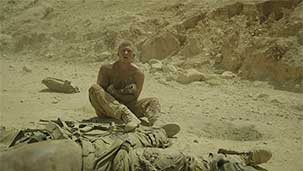Legacy minefields. Now there’s some Newspeak for you.
This is the term used to describe the millions of unexploded mines that litter the landscape of Afghanistan—most of which are left over from the Soviet incursion in the eighties.
It was your job to faithfully reproduce the injuries that these anti-personnel mines inflict. And you were uncomfortably successful. Perhaps the most important fact about these mines is that they are designed to maim, rather than to kill, in order to drain resources away from engagement with the central conflict. But with the advances in battlefield medicine, unprecedented numbers of soldiers are surviving the kind of injuries that just a few decades ago would have almost certainly killed them. This is both a blessing and sometimes a curse.
Kilo Two Bravo is the story of 3 Para, a small company of British soldiers tasked with overseeing a desolate piece of the Afghani landscape in 2006. A three-member patrol is moving through a dry riverbed—or wadi—when one of them steps on one of the aforementioned legacy mines. The rest of the story becomes an almost unbearably tense clusterfuck of failed rescue attempts, which make up the most uncomfortable two hours of film I have ever experienced. Once the first mine explodes (and there had been a number of foreshadowing events, including a camp dog missing a back leg) every footfall and stray rock is potentially fatal—or at least disabling.
Interestingly, for a war film, there is nary a shot fired in anger. In fact, the only close contact the company has with indigenous Afghanis comes very early in the film—in a moment that is almost absurdly benign. This is a film about the kind of damage that war does to the human body and it is relentless in that depiction. The work you did in mimicking the debilitating injuries these mines inflict was on constant display—and was made all the more effective by the level of authenticity the whole production exhibited. I have personally spent some time in and around the military and these were exactly the sort of conversations and personalities I’ve experienced—especially around the lower ranks. Right down to the slightly melodramatic tattoos and hyper-masculine displays.
Time and energy is spent fleshing out these real-life characters—the film meticulously reenacts an actual incident—and the film possesses an understated naturalism that made the whole experience impossible to distance oneself from. There is no engagement with larger geopolitical issues, nor does it feel like there is a particular agenda at work, other than to document, as lucidly as possible, a very specific set of horrifying circumstances.
But that doesn’t mean Kilo Two Bravo doesn’t raise the spectre of just how appalling these legacy minefields are. These men, as badly as they are injured, have a vast infrastructure to support them, however imperfect those institutions may be. From the medical treatment they receive onsite to the hospital and rehabilitation facilities they have access to when they return home (one of the soldiers, after losing a leg, returns to active duty with a sophisticated prosthetic) there is, at least, some hope to live close to a normal life.
Unfortunately mines don’t discriminate between an Afghan child and a combatant. Which couldn’t help but raise the question of how often this occurs when the people subjected to this kind of violent trauma don’t have access to modern military field medicine, or helicopter evac, or physical therapy, or advanced prosthetics. What kind of physical and emotional damage that will that inflict over the course of generations, and how can that do anything other than foster hostility and distrust?
So while I certainly respected the horror that these men endured and the heroism they displayed, I was left with a nagging question at the end of this film. What does it really mean when we use the term “legacy” minefield?
Sincerely,

Tim







